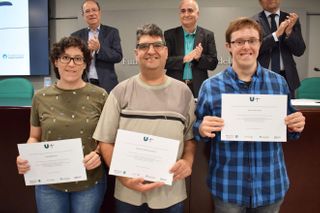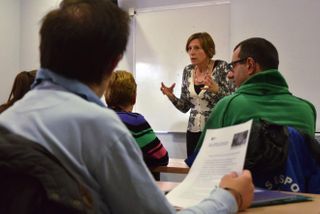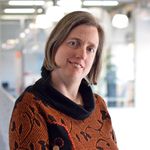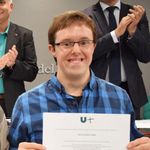- UniversiMés is a university extension programme on the Manresa campus for people with learning disabilities
- The students receive cultural and humanistic training to develop their curiosity and critical thinking, in a pioneering initiative in Spain
The Manresa campus launched UniversiMés in the 2016-2017 academic year, as a two-year university extension programme specifically designed so that people with learning disabilities could experience studying at university. The initiative was also aimed at transforming the university itself, in the sense of making its community more diverse and inclusive.
The International Continuing Education Centre on the Manresa Campus and the Ampans Foundation have worked together to shape the programme since its inception. In addition, since the programme was run for the first time, they have received financial support from the BBVA bank and Antigues Caixes Catalanes Foundation, which have also been involved in organising and raising the profile of its activities.
In fact, the programme's sponsorship has been crucial to the success of the experience, as it has ensured that all the students receive a grant for the full tuition fee every year. These grants have made it possible to remove any financial barriers to access to the programme. Those barriers may be related to either the participants' and/or their families' lack of money to spend on education, or unwillingness to invest funds in a programme of this type, even if they are available.
All the students receive a grant that covers the full tuition fee to remove any financial barriers to access to the programme

The first three groups were mostly made up of people from Manresa and the town’s immediate surrounding area. Most were users of one of the services provided by the Ampans Foundation. Students from Osona joined the second and subsequent groups. Many of them work with the Sant Tomàs Foundation, and by the fourth year they made up more than half of the group.
The programme is divided into in six modules, three of which are studied each year: Understanding Today's World, Economics I and II, Art and Culture, Introduction to Art, and Understanding Disability. There are a total of 40 places on the course - 20 in the first year and another 20 in the second year. Apart from the classes, students take part in a learning support session each month, in which they work on group dynamics, receive individual attention and help in the University's process of inclusion.
The training activities and teaching are organised by university teaching staff, who are advised by a psychopedagogical coordinating team which provides them with support in adapting the methodology and contents to the characteristics of the participants. Meaningful and experiential learning is one of the core characteristics. The content is adapted to help cognitive understanding, based on criteria of the universal design of learning and adapting the material for easy reading if necessary. The students receive support material and documentation for each training activity.
A pioneer in Spain
Unlike other university programmes for people with disabilities, UniversiMés does not aim to improve the participants' employability, either in terms of their qualifications or skills. That is what makes it a pioneering course in Spain. It basically aims to provide a positive life and educational experience at the university for people with learning disabilities, without the requirement for previous formal education taking into account.
UniversiMés provides a positive life and educational experience at the university for people with learning disabilities

The contents of the programme focus on expanding cultural and humanistic knowledge, providing motivation for lifelong learning, and learning strategies to make the participants into reflective and critical citizens. They take classes in economics, current affairs and art and culture in general. Disability is not the primary focus of attention, but it is treated as a characteristic of the group which means that the methodologies and contents have to be adapted.
Having stable employment that means the students can concentrate and value the opportunity to receive training for their personal development has proven to be one of the factors in the programme's success. That is why it is a criterion used to select participants in the programme. Participants are also required to have a functional level of literacy and numeracy, verbal comprehension and expression, a recognised disability level of less than 65%, and not to suffer from any mental illness or behavioural disorder.
For an inclusive and diverse university
UniversiMés aims to make the University a more inclusive and diverse place. It includes academic activities (classes, external activities and visits by experts), but also ensures that participants have the chance to spend time with students on other programmes and studies, either in the classroom or in the cafeteria during breaks. The programme is an innovation in the university world, by seeking to normalise the presence of people with learning disabilities, which is why their integration into university life involves the entire community.
The programme's transformative commitment, among both the people directly involved in it (students, teachers and student volunteer mentors) and the environment in which it takes place (the university community and society as a whole), places particular emphasis on communication initiatives. Explaining the programme's successes and above all the fact that it can be replicated in other contexts has been a constant feature since its inception.
Various strategies have been used to enhance the experience's profile, including events linked to academic activities (such as the grant award ceremony at the beginning of the course and the graduation ceremony, at the end), the inclusion of news items in the media about important points in its academic dynamics, and the programme's blog, where students write regularly to discuss their learning and experiences associated with their participation in the programme.
The study on the impact of UniversiMés
A survey conducted in December 2019 among students in the first two groups taught on the programme showed that UniversiMés is a transformative experience that improves the self-image and confidence of the people who participate in it. In general, after taking part they feel more capable and ready to continue training and learning. Most alumni say they are more self-confident, in the sense that they are comfortable dealing with challenges that they previously believed were beyond them.
UniversiMés improves the self-image and self-confidence of the participants

The results of the survey also show that in many cases, the programme has opened up new perspectives for students during their leisure time and has got them into the habit of keeping informed about current events. Many alumni claim say that after taking part, they use the cultural resources around them to a much greater extent.
The study also highlights a great deal of interest among the students surveyed in economics, an area of knowledge from which people with learning disabilities are usually excluded. The programme's coordinators, Cristina Llohis and Laia Cladellas, attribute this to “the positive link they established with the teaching staff who taught this part of the programme. It was something that contributed decisively to making them interested in the different subjects, even among those that could have been assumed to be more difficult, taking the characteristics of these students into account.” Making the learning meaningful for students and ensuring their emotional attachment to the course has been seen to be a key aspect in the training of these people.
The positive link with the teaching staff has helped to attract interest in complex subjects such as economics

At first hand

Montse Alonso
Montse Alonso works at the newspaper kiosk at the Hospital de Sant Joan de Déu in Manresa. She is 48 years old and enjoys reading, browsing the Internet and walking around her home town of Manresa. She was part of the first group of UniversiMés students. She says that participating “helped to think more, to do more critical thinking and to add new knowledge.” She particularly remembers the culture and economics classes. “I didn't always agree with the teachers, but I respected their views.” She was often surprised when she came out of her classes: “I discovered things like the link between terrorism and the oil business. I had no idea about that.”

Eloi Collell
Eloi Collell is from Vic and he is 33 years old. He works as a receptionist at the Osona Red Cross. As a swimmer, he has won several medals at the Special Olympics. He is also a member of the Sagals d'Osona castellers group. This summer he presented a programme of interviews on Catalonia's TV3 television channels, called Per què volen els avions? [Why do planes fly?]. He describes himself as “a curious person who likes to ask questions.” That is undoubtedly why he is enjoying the UniversiMés programme so much, and the art and history classes in particular. He is a second-year student and should have graduated last June, but was unable to do so as classes were interrupted by the lockdown in March. He will resume them in November, and aims to take advantage of the opportunity to be a university student offered by the programme until the final day.